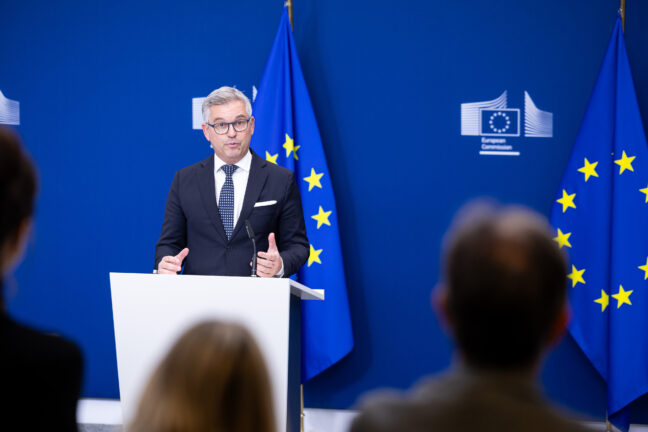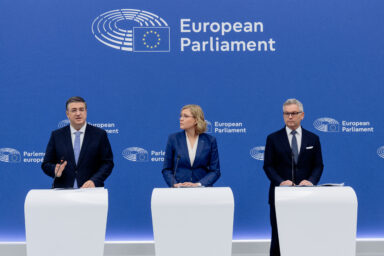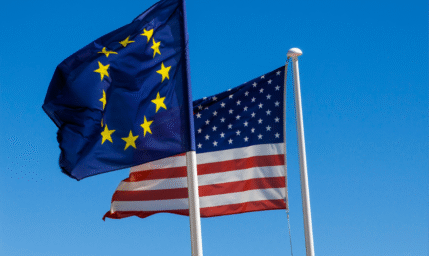“We are turning the page, showing control and unity, and supporting the member states that are facing the most disproportionate pressures.” That was how the Commissioner for Internal Affairs and Migration, Magnus Brunner, put it at the launch of the first Annual Migration Management Cycle under the framework of the EU’s Pact on Migration and Asylum. For Brussels, the balance between solidarity and responsibility lies at the heart of the Migration Pact, which will come into operation in June 2026.
The Annual Cycle provides a comprehensive overview of asylum and migration in the EU, highlighting the situations that member states face daily. It also proposes an Annual Solidarity Pool, which must be adopted by the Council. The first Annual European Report on Asylum and Migration shows continuous improvement during the reference period (July 2024–June 2025), including a 35 per cent decrease in illegal border crossings.
“At the same time, challenges remain, such as the continued pressure of irregular arrivals and unauthorised movements within the EU, the reception of refugees from Ukraine, the militarisation of migration by Russia and Belarus at the external borders, and cooperation on returns and readmissions,” the report reads.
Uneven migratory pressure
Based on the report’s data, the Commission found that across the 27-member bloc, member states face different levels of migratory pressure. Greece and Cyprus are under particular strain due to high arrivals in the past year, while Spain and Italy are similarly affected because of large numbers arriving via search and rescue operations at sea.
A European official explained: “All types of search and rescue operations that could be carried out had been included in calculations. Then, regarding irregular arrivals, these are counted, but they are not counted for search and rescue, because they fall into a different category. When calculating which Member States face a disproportionate number of obligations, this is calculated on the basis of EU-wide data, and here we also take into account what the fair share is for each Member State and the volume of that fair share in proportion to the others. And in this calculation, we came to the conclusion that Greece and Cyprus, due to the irregular number of arrivals, are under disproportionate pressure in terms of obligations they must meet, while Spain and Italy are under disproportionate pressure in terms of search and rescue operations.”
You might be interested
Hybrid threats and drone support
Belgium, Bulgaria, Germany, Estonia, Ireland, France, Croatia, Latvia, Lithuania, the Netherlands, Poland and Finland are at risk of migratory pressure due to high arrivals last year, ongoing strain on their reception systems, or the potential weaponisation of migration, which could create disproportionate obligations in the coming year. These countries will have priority access to the EU’s migration support toolkit, and their situation will be reassessed as conditions evolve. To assist Member States facing hybrid threats and increasing drone incursions, a €250m public tender will be launched for drone procurement.
Italy is a special case. “Over the past year, Italy has continued to record a high number of arrivals, and for this reason, it will be able to count on the support of the new permanent solidarity mechanism, but it will also have to comply, of course, with the obligations on the other side in terms of responsibility and the sequences. The two things must go hand in hand, in parallel,” said Commissioner Magnus Brunner, clarifying European intentions. Italian Commissioner and Executive Vice-President Raffaele Fitto announced on X the success (which had been led by Prime Minister Giorgia Meloni with informal meetings ahead of the EU Council) of the Solidarity Pool:
“The solidarity mechanism is both mandatory and flexible, ensuring that all Member States contribute fairly, based on their capacities and specific needs. A concrete step towards a European migration policy based on shared responsibility and genuine solidarity,” Fitto wrote.
Exemptions for some member states
Austria, Bulgaria, Croatia, Czechia, Estonia, and Poland—countries that, according to the European Commission, face a serious migratory situation (Czechia hosts hundreds of thousands of Ukrainians refugees who fled their homeland after Russia’s 2022 invasion)—will be able to request full or partial exemption from migrant relocation next year under the Pact on Migration and Asylum.
Member states can also choose alternative measures to relocation. This means it is not binding. – Marcus Brunner, Commissioner for Internal Affairs and Migration
Each country may submit a request to the EU Council, which will then decide by qualified majority. If approved, the exemption will last one year. The Pact provides three ways for member states to show solidarity with those under migratory pressure: relocating migrants, providing a financial contribution, or offering operational support. “Member states can also choose alternative measures to relocation. This means it is not binding,” Commissioner Brunner explained at the press conference.
Next steps
The Council now needs to adopt the Commission’s proposal and agree on the size of the Solidarity Pool and how each Member State will contribute according to its fair share. Once approved, contributions will be public and legally binding. Member states may choose the form of their contribution—between solidarity persons (relocation or responsibility offsets, if applicable), financial support, alternative measures, or a combination.
To maintain the balance between solidarity and responsibility, the Pact ensures that contributing states are not required to implement their commitments toward a member state under migratory pressure if the Commission identifies systemic deficiencies in that state under the new responsibility rules.
The Commission will evaluate the situation in July 2026 and again in October 2026.











